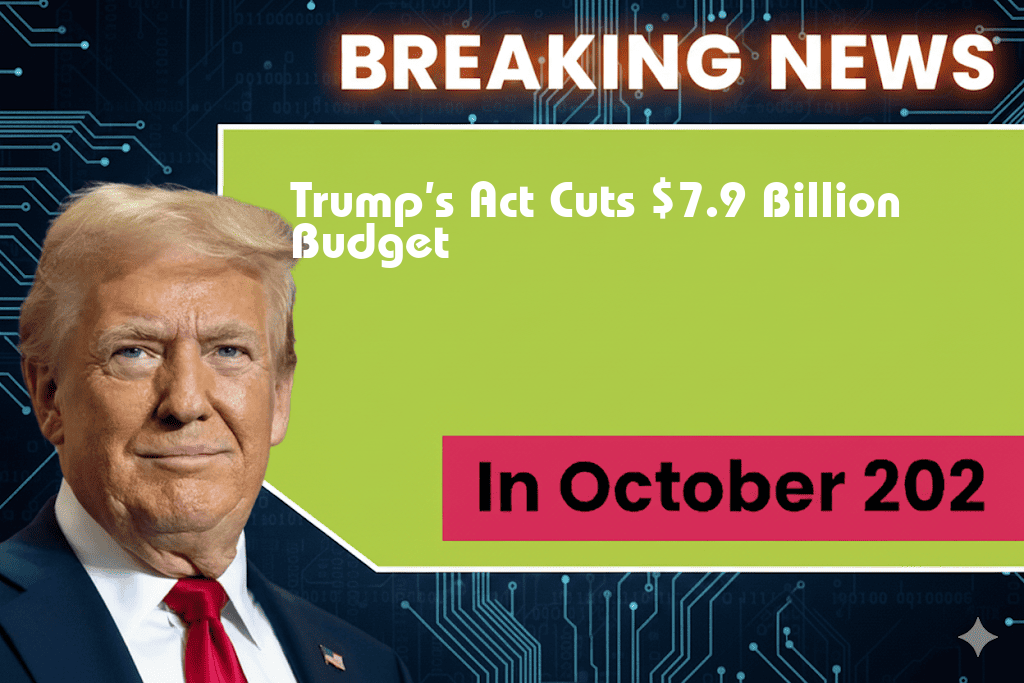In a significant move that has drawn both praise and criticism, former President Donald Trump has enacted the Rescissions Act, effectively cutting approximately $7.9 billion from the federal budget. This legislation, aimed at reducing government spending, targets various programs and appropriations deemed unnecessary by the Trump administration. The decision comes in the wake of ongoing debates surrounding fiscal responsibility and government efficiency, as the nation grapples with rising debt levels. Supporters argue that the cuts are a necessary step towards a more sustainable budget, while opponents contend that they could undermine essential services and programs. The Rescissions Act is expected to impact numerous sectors, including education, healthcare, and infrastructure, raising questions about the long-term implications of these reductions.
Key Details of the Rescissions Act
The Rescissions Act presents a comprehensive approach to budget cuts, addressing various areas of government spending. Below are some of the key points outlined in the act:
- Targeted Cuts: The act specifies which federal programs will face reductions, with particular emphasis on discretionary spending.
- Budget Process: The act is designed to streamline the budget process by eliminating unnecessary expenditures that have been deemed ineffective.
- Political Reactions: The passage of the act has sparked significant debate among lawmakers, with strong opinions from both Republicans and Democrats.
Impact on Federal Programs
The cuts introduced by the Rescissions Act will have wide-ranging effects across various federal programs. Some of the most notable reductions include:
| Program | Amount Cut ($) | Impact |
|---|---|---|
| Education Grants | 1.5 billion | Reduced funding for public schools and educational initiatives. |
| Healthcare Services | 2 billion | Potential cuts to Medicaid funding and public health programs. |
| Infrastructure Projects | 3 billion | Delays in major construction and maintenance projects nationwide. |
Political Reactions
The Rescissions Act has elicited a variety of responses from political leaders and analysts. While many Republicans support the initiative as a means of fiscal conservatism, Democrats have raised concerns about the potential adverse effects on vulnerable populations and essential services.
Supporters’ Perspective
Proponents of the Rescissions Act argue that the cuts are necessary to address the nation’s growing debt crisis. They contend that reducing spending in non-essential areas will allow for more efficient allocation of resources and promote fiscal responsibility. Republican leaders have praised the act as a decisive step toward a balanced budget.
Opponents’ Concerns
Conversely, critics warn that the cuts could lead to detrimental consequences for millions of Americans who rely on federal assistance. Advocates for education and healthcare have expressed fears that such reductions will exacerbate inequalities and undermine critical services. Many Democrats have vowed to fight against the cuts, arguing that they prioritize budgetary concerns over the well-being of citizens.
Looking Ahead
The enactment of the Rescissions Act marks a pivotal moment in U.S. fiscal policy. As the nation continues to navigate economic challenges, the long-term effects of these budget cuts remain to be seen. Stakeholders from various sectors are closely monitoring the situation, anticipating both the outcomes of the current cuts and the potential for future legislation. With the political landscape rapidly evolving, the debate over federal spending is far from over.
For more information on the implications of the Rescissions Act, you can visit Forbes and Wikipedia.
Frequently Asked Questions
What is the purpose of Trump’s Rescissions Act?
The Rescissions Act aims to reduce federal spending by cutting $7.9 billion from the budget, targeting areas where funds are deemed unnecessary or excessive.
How will the $7.9 billion be allocated in cuts?
The cuts from the budget will be spread across various federal programs, focusing on eliminating unspent funds and reducing appropriations that are no longer needed.
What impact will the cuts have on federal programs?
The impact of these cuts may vary, with some programs facing reductions in funding that could affect their operations, while others may be less impacted due to already low spending.
Who supports the Rescissions Act?
The Rescissions Act has garnered support from fiscal conservatives who advocate for reduced government spending and believe in the necessity of cutting wasteful expenditures.
What are critics saying about the Rescissions Act?
Critics argue that the Rescissions Act could harm essential services and programs, claiming that cutting $7.9 billion could lead to negative consequences for vulnerable populations relying on federal assistance.
